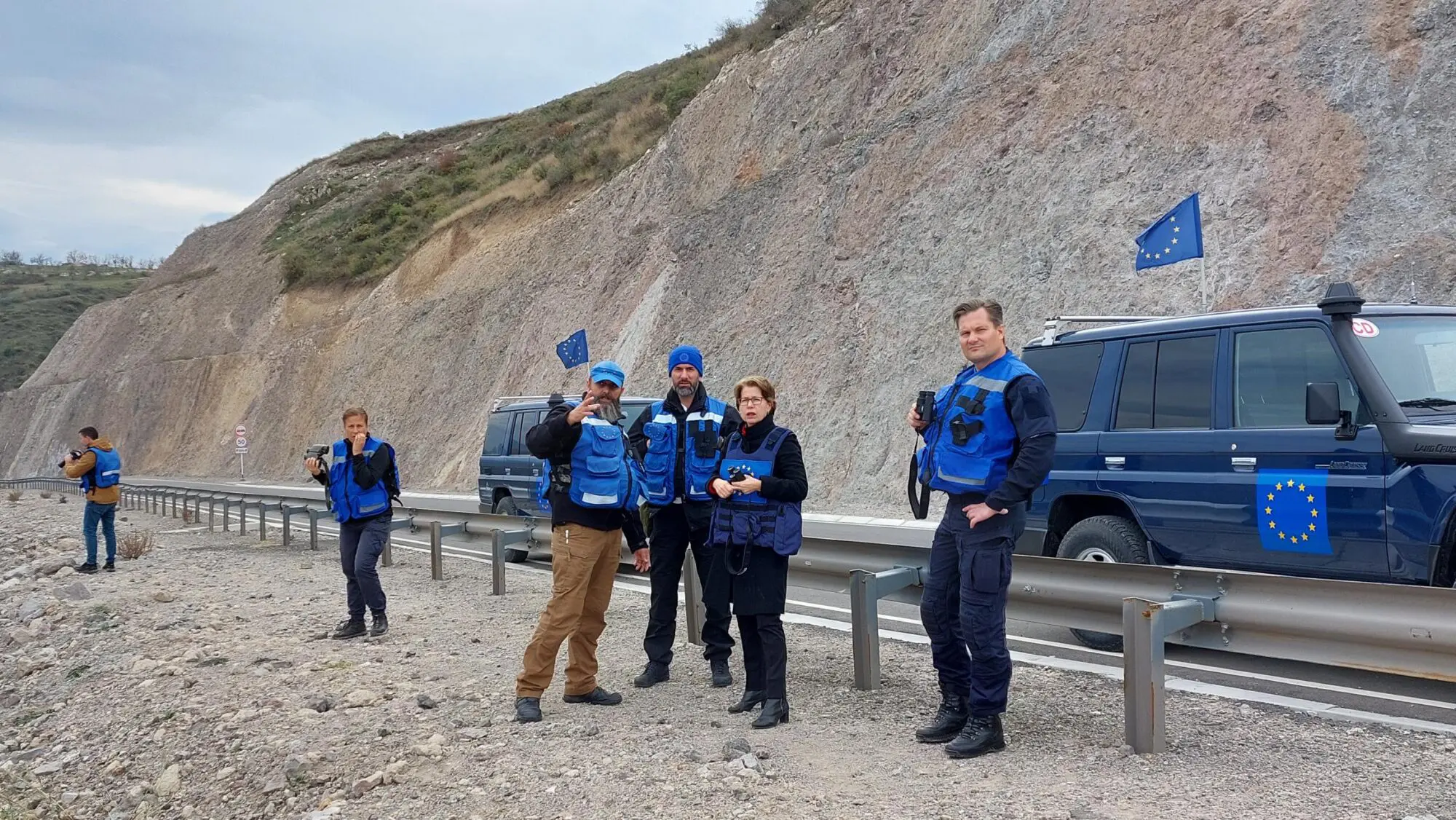
European Union Mission in Armenia hosting Ambassador of Latvia, Edīte Medne, on patrol near the entrance to the Lachin corridor, November 22, 2023.
Photo: @EUmARMENIA on X, 22 November 2023
French-led efforts by the EU to secure the Armenian nation against an anticipated invasion from Azerbaijan received a boost Monday morning with news that member states have backed plans to send military aid to the beleaguered Caucasian nation.
In a symbolic move supporting Armenia’s recent efforts to advance its EU membership ambitions, the European Council approved €10 million in military assistance from the European Peace Facility, a joint defence fund that all EU countries contribute to based on the scale of their economies.
EU monitors have been deployed on the disputed border region between Armenia and Azerbaijan since October 2022. The border has officially been undemarcated since the 1991 fall of the Soviet Union.
The conflict between the two countries has never stabilised since the war in 2020 for control of Nagorno-Karabakh—until January 2024, a de facto independent state, populated by Armenians and relying heavily on the Armenian government—decisively broke a previously agreed-upon ceasefire. Azerbaijan has since taken advantage of the Russo-Ukrainian war, which resulted in the disengagement of Russia from the region, where they had previously provided some protection for the Armenian population.
Western observers have accused the Azeri government of ethnic cleansing in Nagorno-Karabakh after Azerbaijan’s military seizure of the area in 2023. Azerbaijan, a Muslim-majority country—whose constitution states its government is secular—heavily regulates the establishment of religious organisations and has been accused of persecuting non-Muslim faiths. The country has also destroyed monasteries, churches, and cemeteries on occupied territory of the 96% Christian Armenian nation.
Armenia is moving closer to formally launching a bid for EU membership amidst anticipation of a new offensive from Azerbaijan. U.S. Secretary of State Antony Blinken, European officials, and Armenian Prime Minister Nikol Pashinyan met in Brussels in April to discuss future military plans.
As part of today’s announcement, Armenia will gain access to new visa liberalisation with the EU, along with the possibility of EU ‘rapid deployment forces’ sent to Armenia if necessary.
The EU does not formally have its own military forces outside the EU Battlegroup, overseen by the Council of the European Union. Deployment of battalions from the Battlegroup, in place since 2007 but never utilised, must be unanimously approved by all member states. Plans for a ‘Rapid Deployment Capacity’ of 5,000 soldiers, which would only need a qualified majority for deployment, were leaked last year.
Both the EU and U.S. are hoping to capitalise on Armenia’s departure from the Russian-led CSTO military alliance.
“Armenia is pivoting away from Russia and towards the West—to a future of deeper ties with Europe,” cheered former NATO boss Anders Fogh Rasmussen, reacting to the news from Brussels. The Danish politician has championed the Armenian cause and previously warned that the country runs the risk of being dragged into an Asian autocracy.
Former Armenian diplomat Sossi Tatikyan also welcomed the news of further EU support, describing EU membership as the “next step” to safeguarding Armenian statehood. The Azeri government, meanwhile, has threatened to jeopardise gas deals with Europe in retaliation for EU support of Armenia.
France has taken a particular interest in Armenia’s EU integration by already sending military aid in the form of French-made military-style rifles and short-range Mistral missiles.
Azerbaijan responded to French intervention in Armenia by supporting a rebellion against French rule on the Pacific island of New Caledonia in May, resulting in many insurgents brandishing Azeri flags as they fought security forces.
Azeri autocrat Ilham Aliyev made additional threats against Armenia this month, describing it as “western Azerbaijan”. The United States continues military exercises with the Armenian Army in the hopes of filling the vacuum left by Russia.
